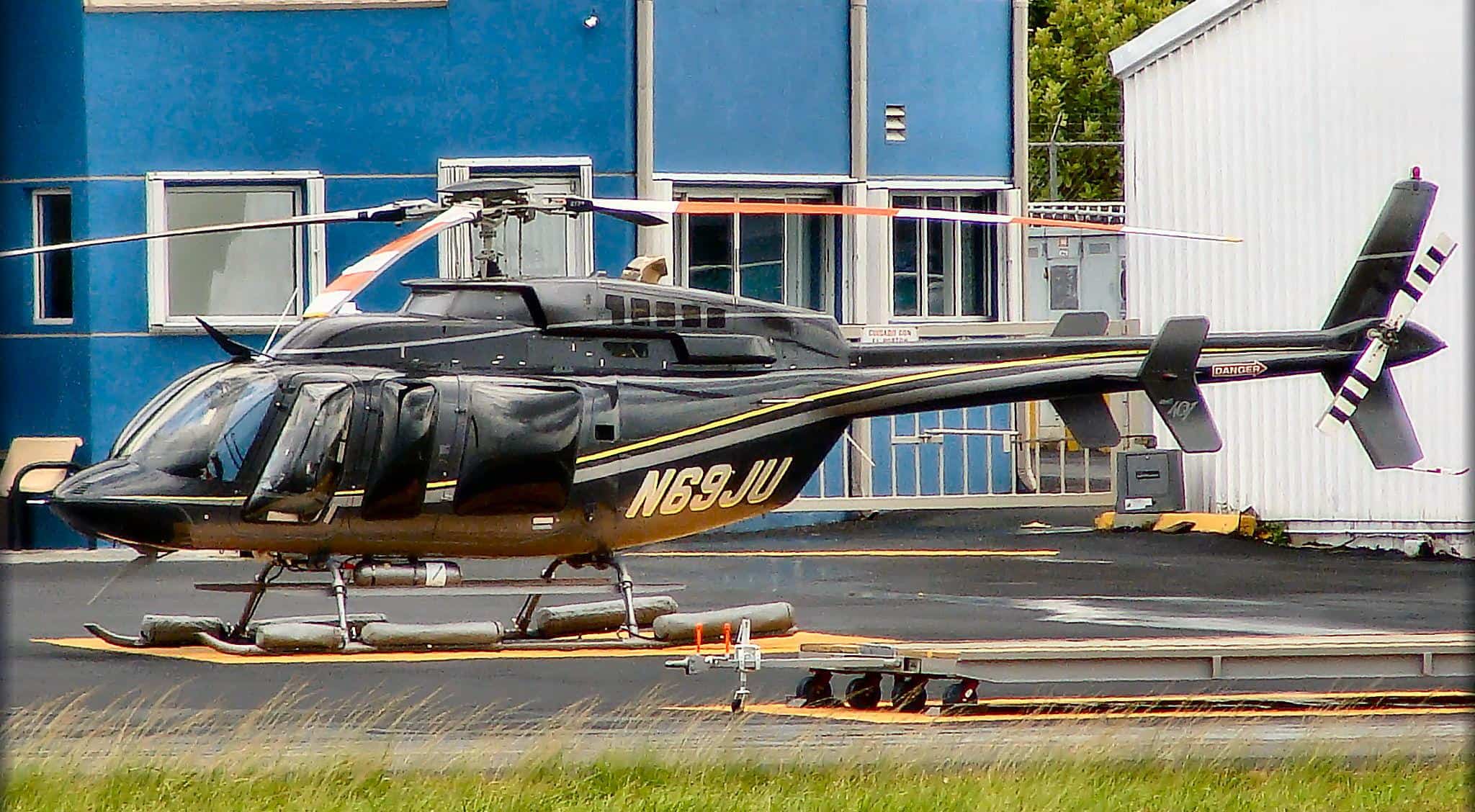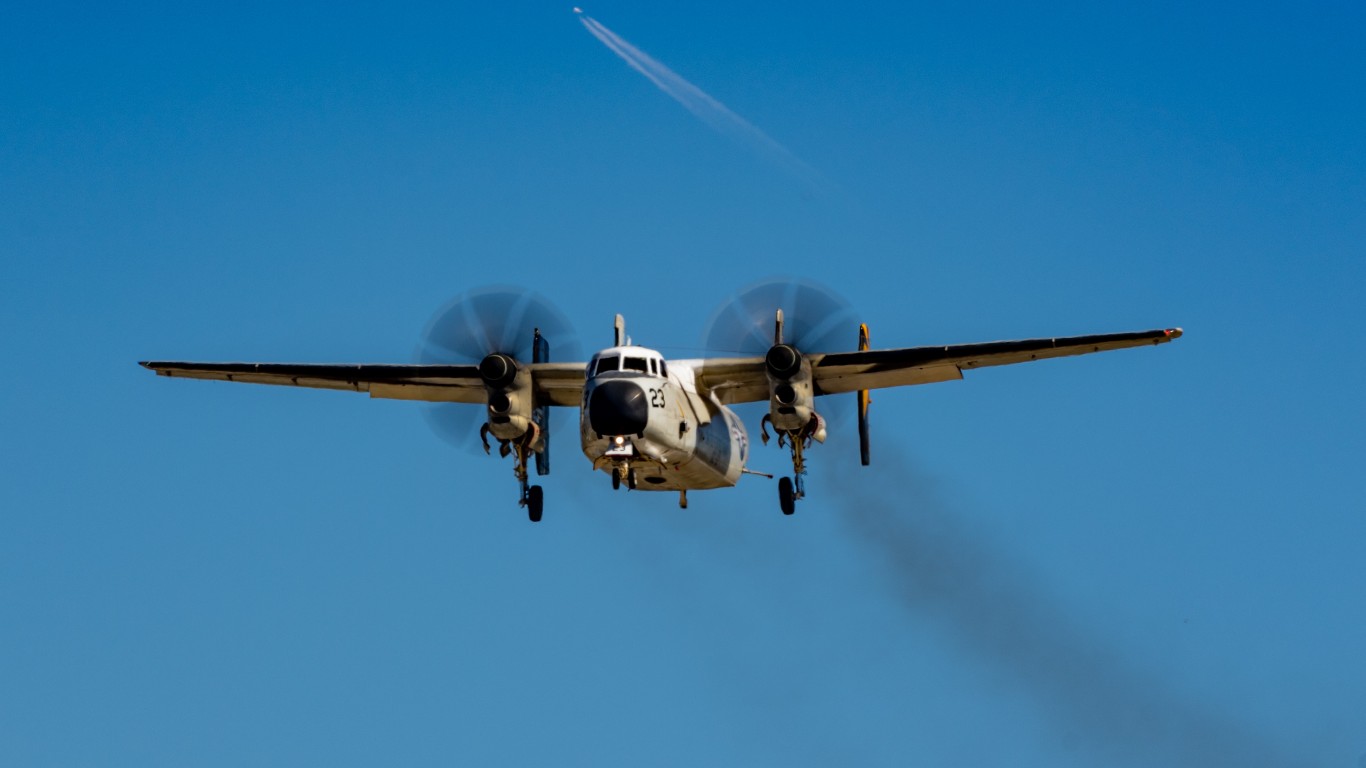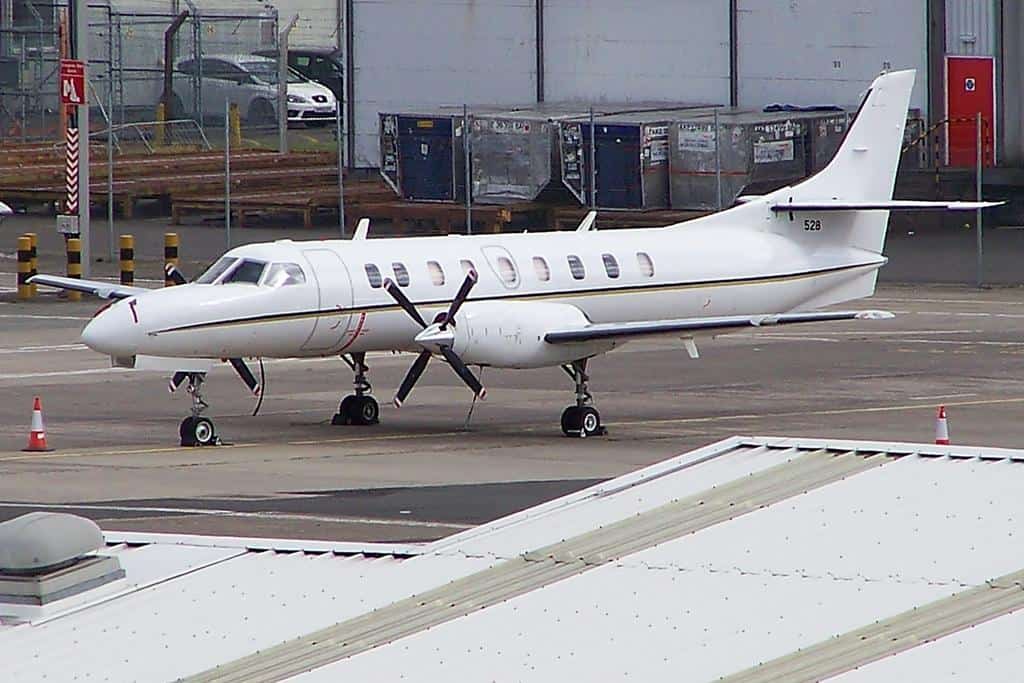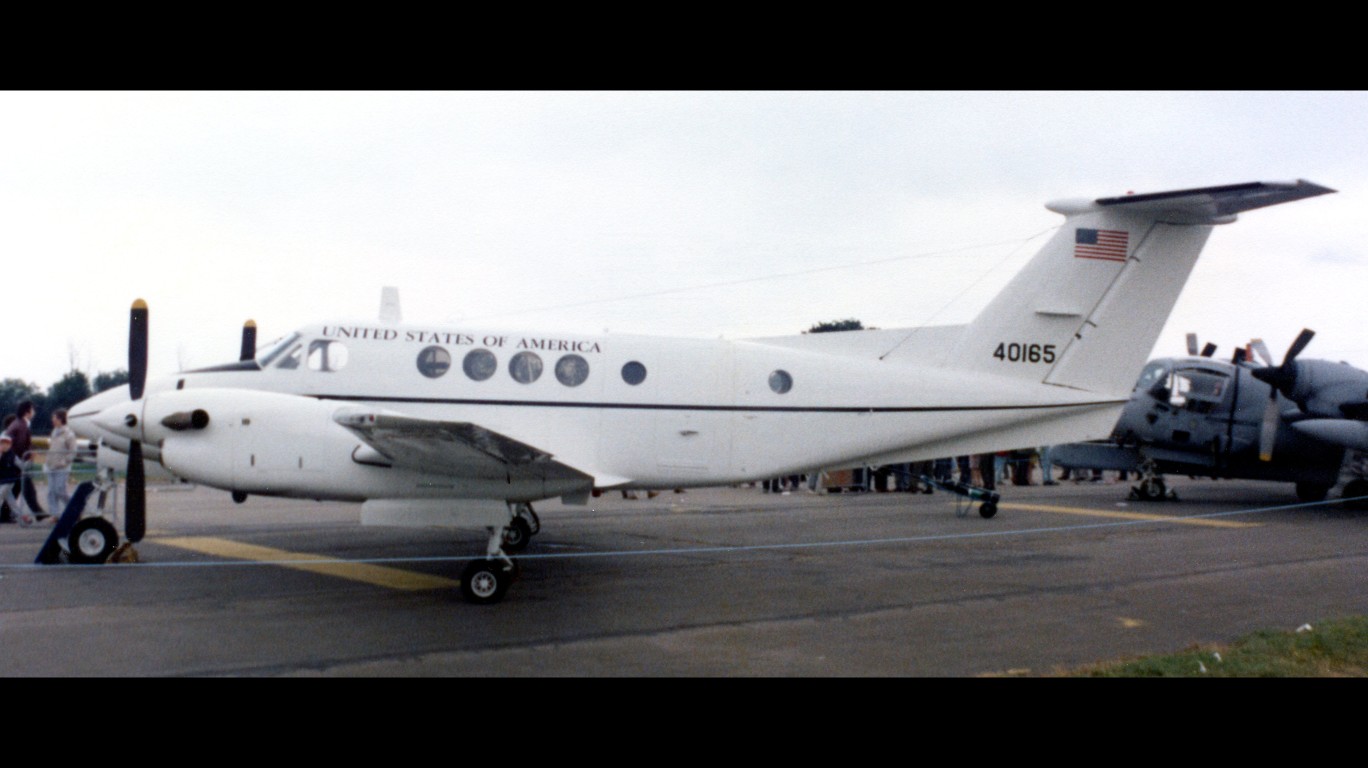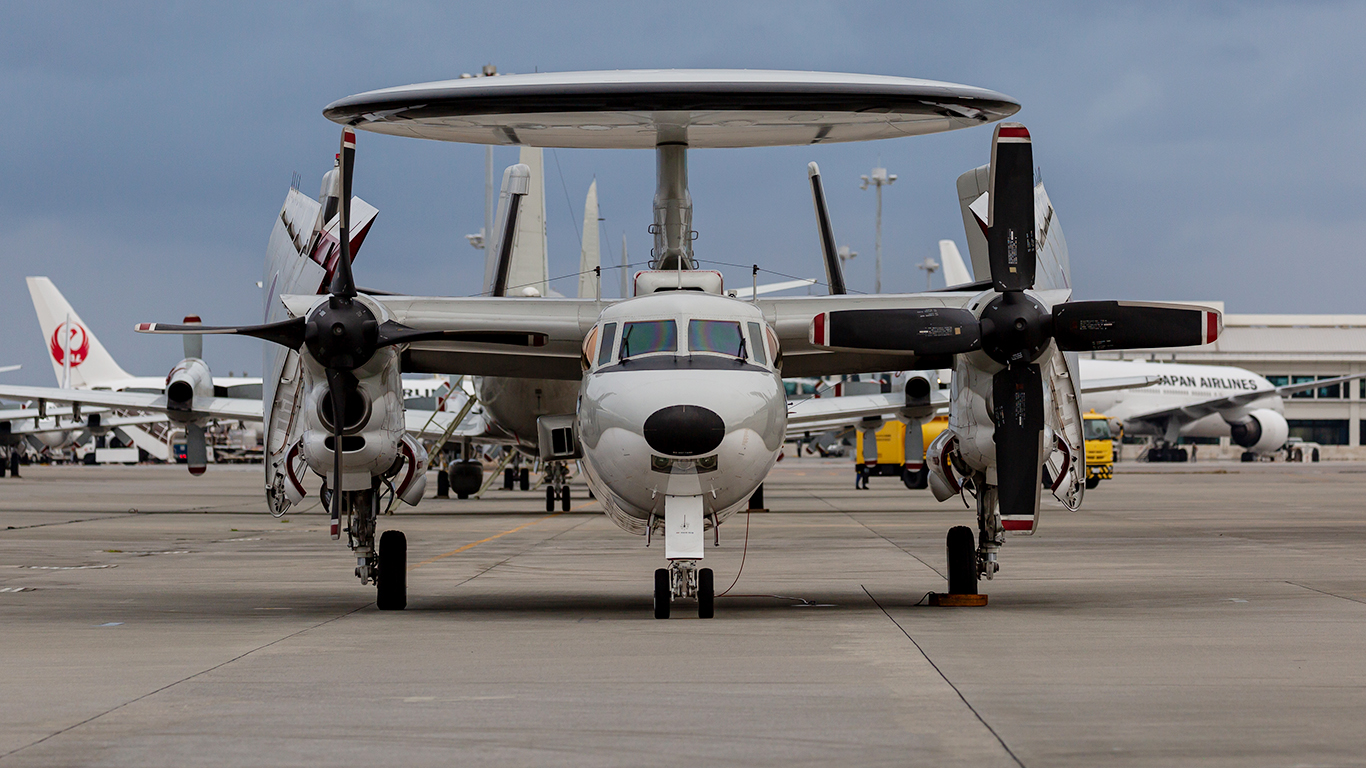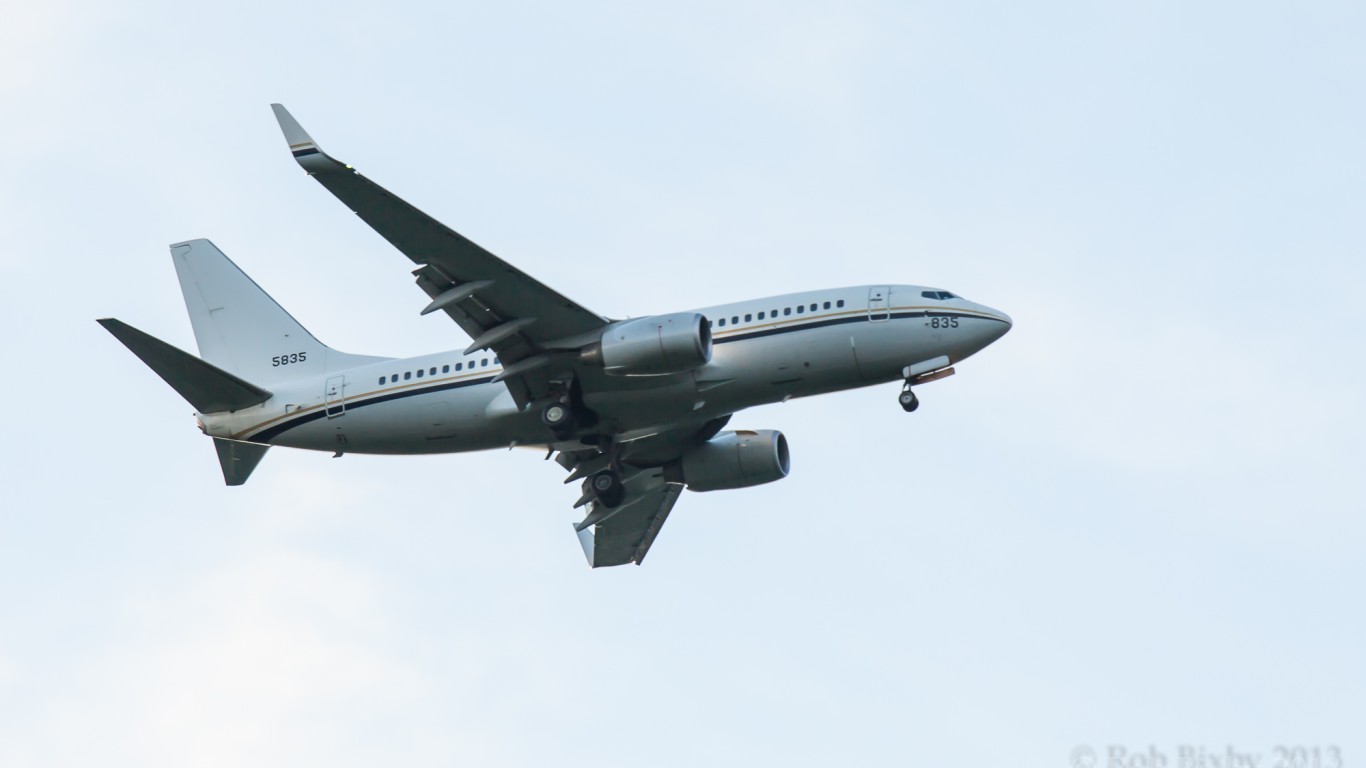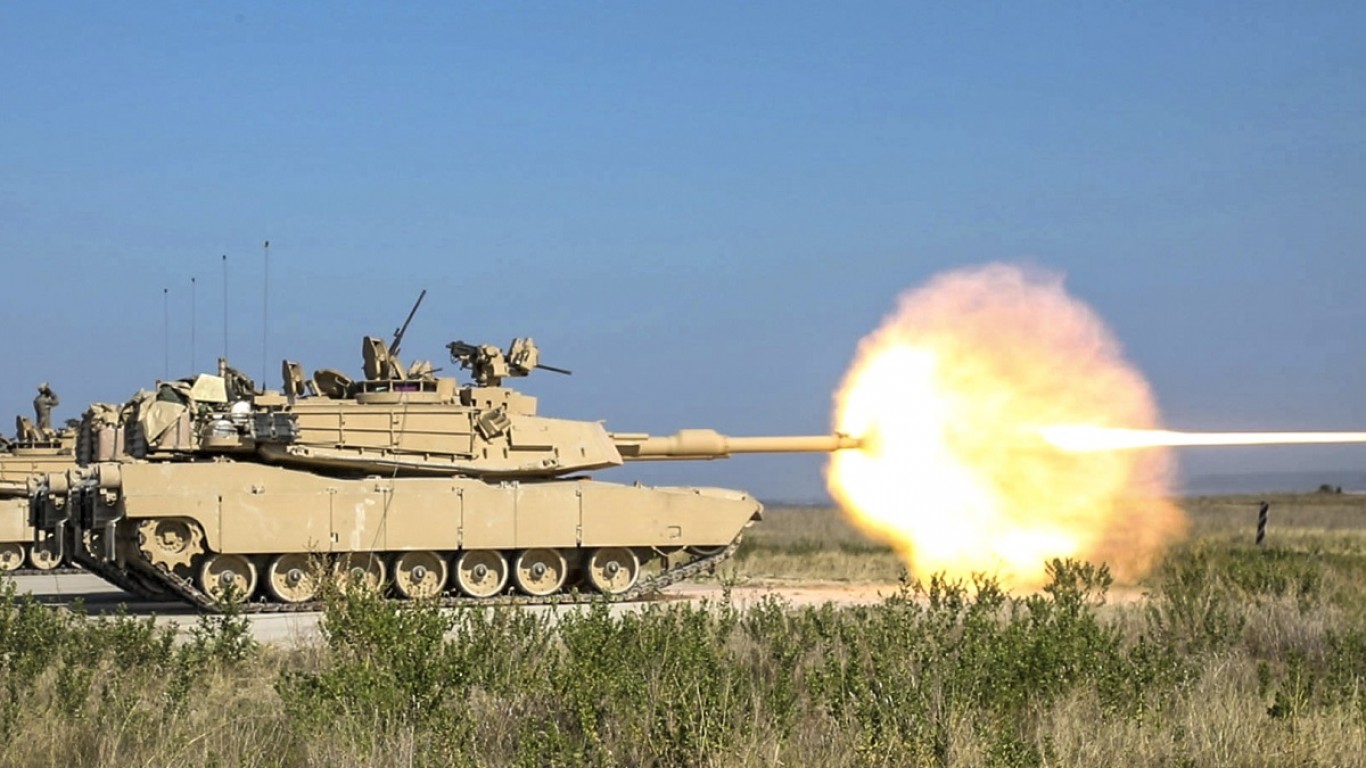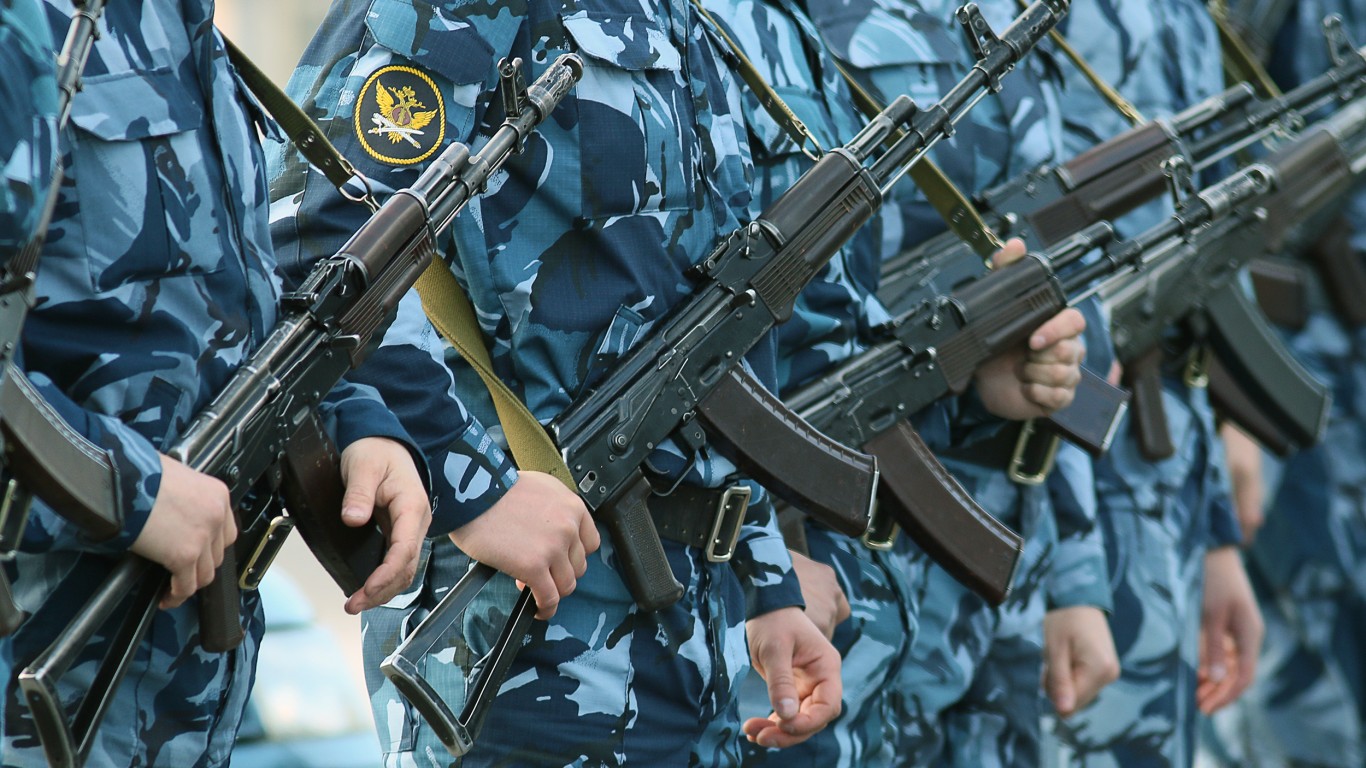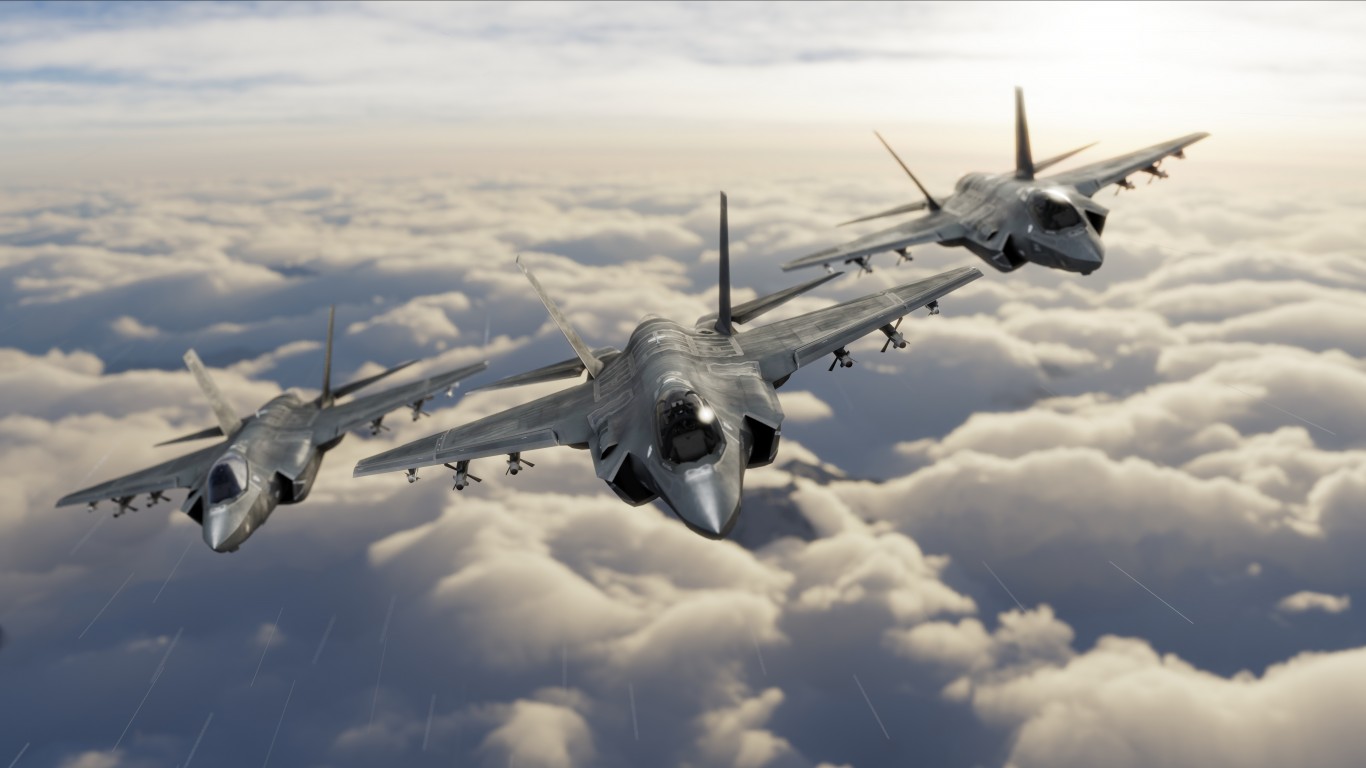
24/7 Wall St. Insights:
- The U.S. Navy, as a standalone, operates one of the largest air forces in the world
- The F.A-18 Super Hornet can hit speeds over Mach 1.5 and is one of the most widely flown aircraft in the Navy
- The F-35C Lightning II is the first stealth fighter designed specifically for carrier operations
- Also: Discover the next Nvidia
The U.S. Navy has always been at the forefront of military aviation. As a standalone military, the U.S. Navy actually operates one of the largest and most advanced air forces in the world. Along with this, the Navy has some of the fastest jets on the planet.
One of the most impressive feats of any modern fighter jet is hitting speeds over Mach 1.5. Speeds like this offer a severe tactical advantage in combat and other operational roles.
One of the standout aircraft of the U.S. Navy is the F/A-18 Super Hornet, which is a carrier-based strike fighter jet. It is one of the most widely used aircraft by the Navy with over 400 of these jets in active service. These can also hit speeds up to Mach 1.8, making the Super Hornet one of the fastest jets in the Navy’s fleet. (The newest aircraft carriers in the U.S. Navy’s fleet.)
Also, the Super Hornet is highly versatile in terms of its armament as a strike fighter. It can equip a wide array of missiles, joint direct attack munitions, and more. As such, the Super Hornet typically performs precision strike missions but it can easily move to fleet defense.
Another powerhouse in the Navy’s lineup is the F-35C Lightning II, the first stealth fighter designed specifically for carrier operations. Capable of reaching speeds just under Mach 2, the Lightning II is one of the newest jets to enter the service, circa 2016. (Nearly 900 of this stealth fighter jet take to the skies worldwide.)
These aircraft, and others like them, are some of the fastest in the U.S. Navy’s fleet, and 24/7 Wall St. is taking a closer look at the Navy’s aerial arsenal.
To identify the fastest aircraft flown by the U.S. Navy, 24/7 Wall St. reviewed data from the 2024 World Air Forces report from FlightGlobal, an aviation and aerospace industry website, and ranked the aircraft according to top speed. Additionally, we’ve included supplemental information on the type of aircraft, how many are in active service, and armament. We have excluded all trainer aircraft.
Here is a look at the fastest aircraft in the U.S. Navy:
Why Are We Covering This?
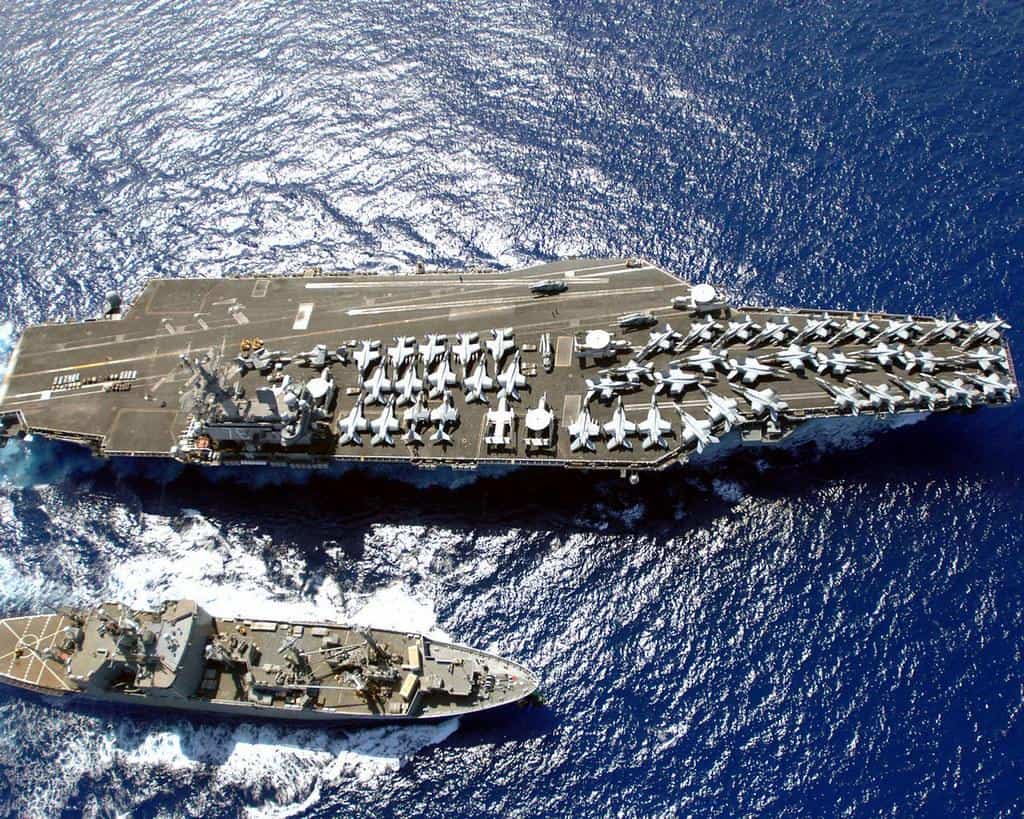
24/7 would like our readers to understand where their tax dollars are being spent. The Navy received $202.6 billion in government funding in 2024, second only to the Air Force at $216.1. billion. In fiscal year 2025, the Navy has requested $16.6 billion of its funding to purchase 75 aircraft and helicopters, which is actually slightly less than in 2024.
18. Bell 407
The Bell 407 is a fairly versatile light utility helicopter that was introduced in 1996. Although it’s on the slower end of what the U.S. Navy has in its fleet, it still performs a variety of necessary roles for the Navy. It has a top speed of 162 mph and is powered by a single engine. Even though the Bell 407 is not equipped with any armament, it is an essential part of the Navy’s rotary-wing fleet, particularly in roles like search and rescue, reconnaissance, and logistical support.
- Type: Light utility helicopter
- Year introduced: 1996
- Active aircraft: 5
- Top speed: 162 mph
- Armament: N/A
17. S-70 Black Hawk
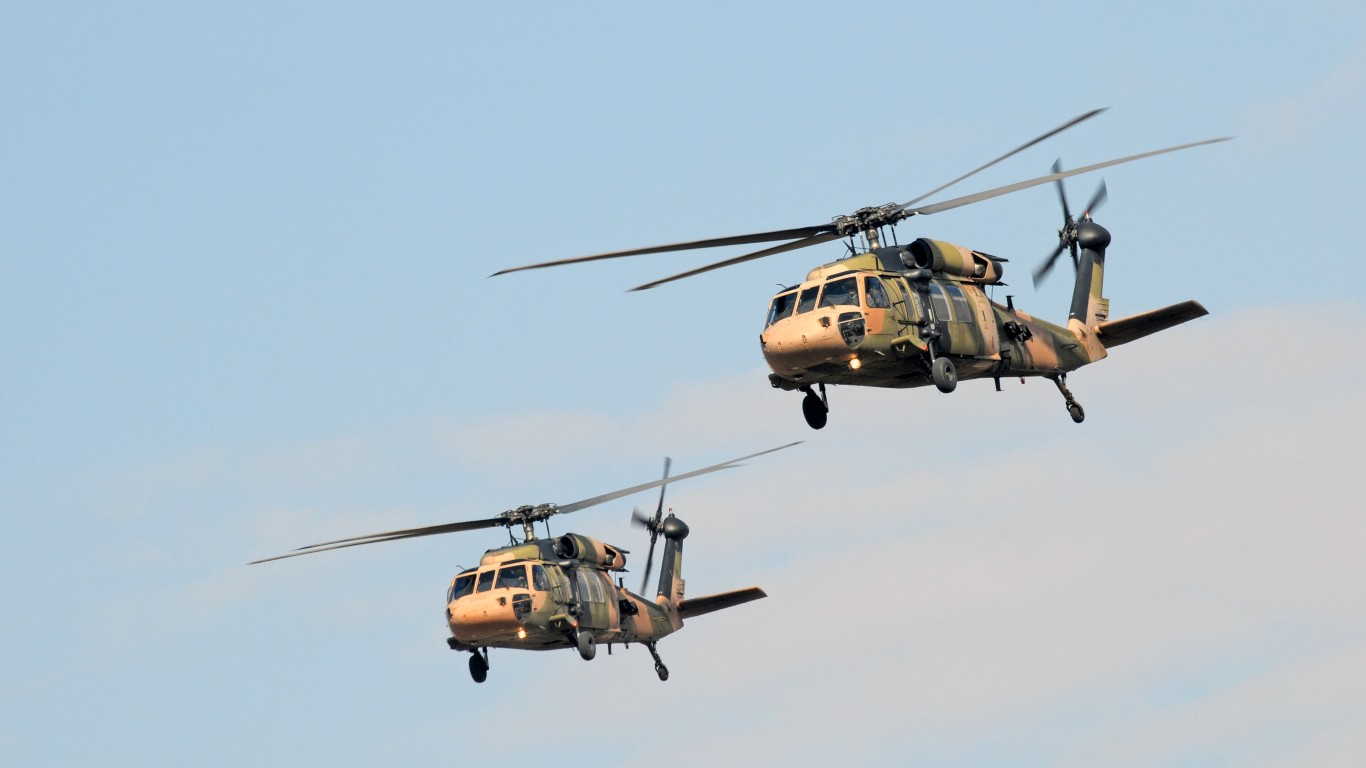
The S-70 Black Hawk helicopter is the most widely-used aircraft by the U.S. Navy with a total of 454 in active service. It comes in a few different variants that perform various roles, anything ranging from combat to logistics. The Black Hawk was originally introduced in 1979. It is one of the more heavily-armed helicopters in service of the Navy, sporting 7.62mm machine guns, Hellfire missiles, 12.7mm and M134 gatling guns, rocket pods, and a 30mm chain gun, making it effective in both offensive and defensive operations. With a top speed of roughly 183 mph, the Black Hawk is one of the slower aircraft and helicopters in service of the Navy.
- Type: Medium-lift multi-mission helicopter
- Year introduced: 1979
- Active aircraft: 454
- Top speed: 183 mph
- Armament: 7.62mm machine guns, Hellfire missiles, 12.7mm gatling guns, M134 gatling guns, rocket pods, 30mm chain gun
16. MH-53E Pave Low
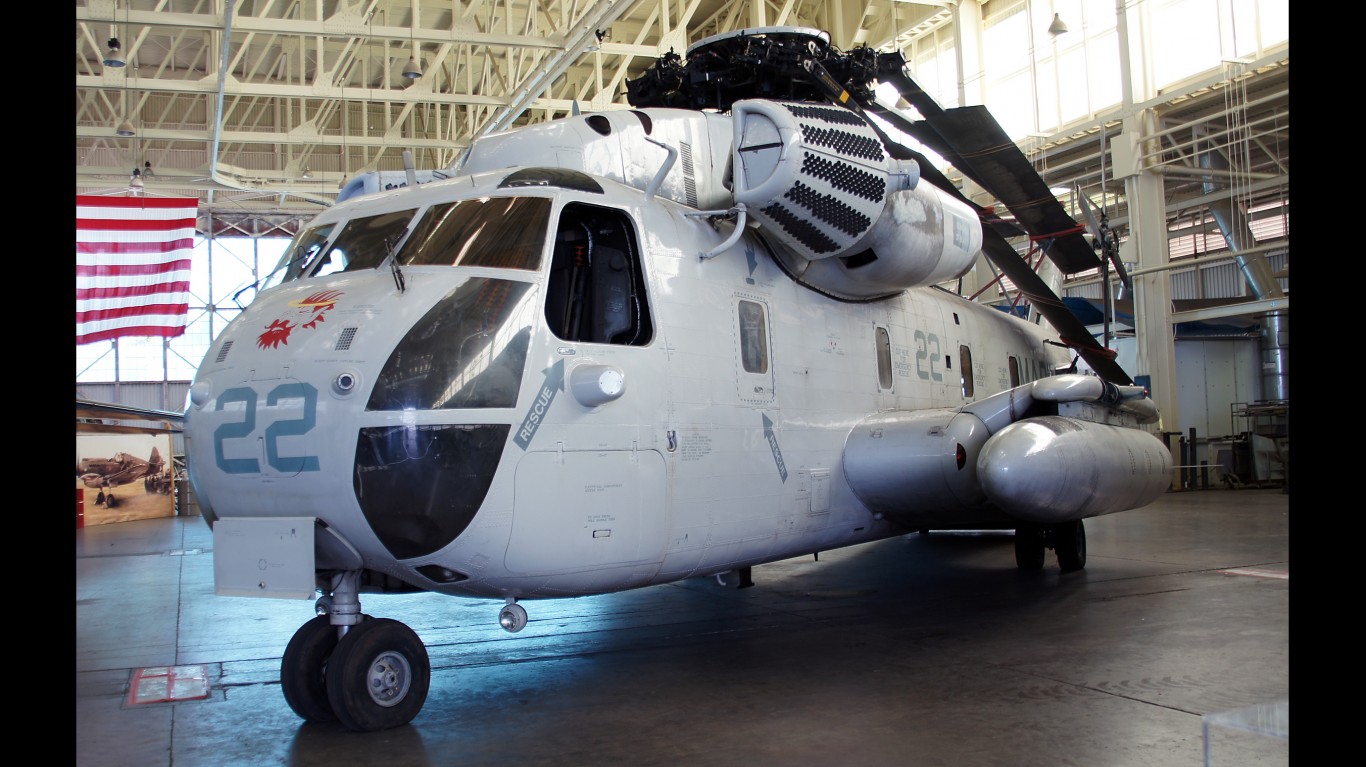
The MH-53E Pave Low, introduced in 1981, is a formidable multirole transport helicopter in the U.S. Navy’s arsenal. What sets the MH-53E apart from other helicopters on this list is its advanced terrain-following and terrain-avoidance radar, allowing it to fly low in adverse weather, making it indispensable in both rescue and combat missions. In terms of its armament, it comes equipped with 7.62mm M134 miniguns and 12.7mm Browning M2 heavy machine guns. Although the Pave Low was introduced back in the 1980s, there are only 26 active aircraft in the Navy.
- Type: Multirole transport helicopter
- Year introduced: 1981
- Active aircraft: 26
- Top speed: 196 mph
- Armament: 7.62mm M134 miniguns, 12.7mm Browning M2 heavy machine guns
15. MV-22 Osprey
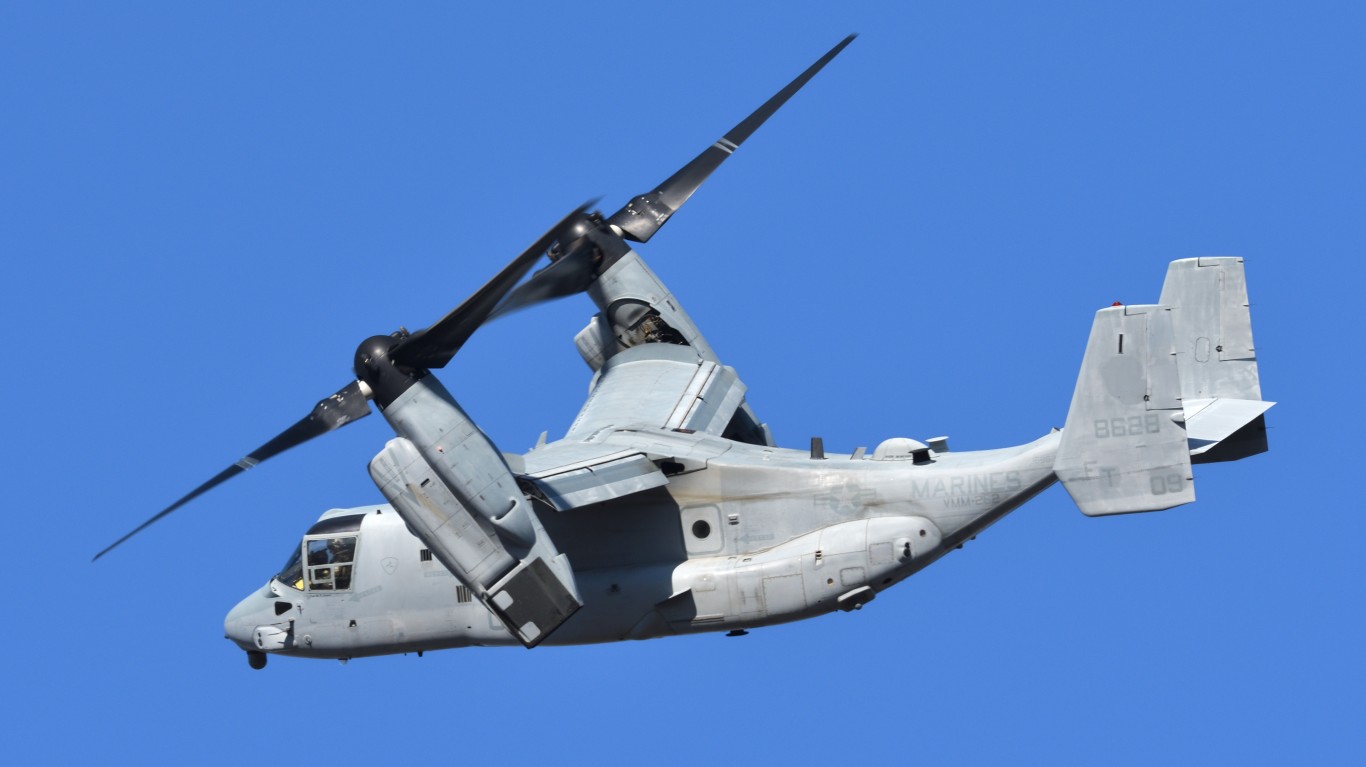
The MV-22 Osprey is one of the most unique aircraft in service of the U.S. Navy today. It is a tilt-rotor VTOL aircraft, meaning it can take off and land vertically, but once in flight its rotors can tilt forward and operate like any standard turboprop aircraft. For an aircraft that has all the features of a helicopter but all the speed of a turboprop, the Osprey is incredibly versatile. In fact, the Marines use this aircraft extensively in their operations for this very reason. The Osprey is primarily used for troop transport, medevac, and special operations missions. It can be armed with 7.62mm and 12.7mm machine guns and it has a top speed over 300 mph.
- Type: Tilt Rotor VTOL aircraft
- Year introduced: 2007
- Active aircraft: 27
- Top speed: 316 mph
- Armament: 7.62mm machine guns, 12.7mm machine guns
14. C-2 Greyhound
The C-2 Greyhound is a carrier-based cargo and transport aircraft that has been a vital part of the U.S. Navy’s logistics operations since its introduction back in the 1960s. It can hit top speeds over 330 mph and is primarily used for delivering personnel and supplies to aircraft carriers at sea. What’s interesting about the Greyhound is its ability to carry roughly 10,000 pounds of cargo and its folding wings which allow for easy storage on the decks of crowded carriers. As a transport aircraft, it comes with no primary armament.
- Type: Carrier-based cargo / transport aircraft
- Year introduced: 1967
- Active aircraft: 26
- Top speed: 331 mph
- Armament: N/A
13. C-26D Metroliner
Introduced in 2003, the C-26D Metroliner operates mainly as a transport aircraft for the U.S. Navy. With a top speed of 331 mph, the Metroliner is typically used for short to medium-range missions, which involve personnel and cargo transport. One unique aspect about this aircraft is that it can operate from short and unimproved airstrips. These aircraft in particularly are used for rapid-response transports for high-priority and movement of key personnel.
- Type: Transport aircraft
- Year introduced: 2003
- Active aircraft: 8
- Top speed: 331 mph
- Armament: N/A
12. C-12 Huron
Despite the Navy only having 13 of these aircraft in service, the C-12 Huron has been a staple of naval operations for decades. The Huron can perform a wide range of missions including intelligence gathering, medical evacuation, and personnel transport. It tops out around 330 mph and comes standard with no armament. A distinctive feature of the Huron is its adaptability for different types of missions. It can be equipped with advanced avionics and sensors that allow for reconnaissance missions among other things.
- Type: Special mission aircraft
- Year introduced: 1974
- Active aircraft: 13
- Top speed: 332 mph
- Armament: N/A
11. E-2 Hawkeye
Serving as a cornerstone of the U.S. Navy’s Airborne Early Warning and Control (AEW&C) system, the E-2 Hawkeye acts as an aerial command post overseeing naval operations. Introduced in 1964, the Hawkeye has been upgraded over the years to feature some of the most advanced radar and communications systems. These allow it to monitor and coordinate naval operations over broad swaths of sea or land, as well as track hundreds of targets simultaneously. The Navy currently has 83 of these E-2s in active service. It has a top speed of roughly 375 mph.
- Type: Airborne command post
- Year introduced: 1964
- Active aircraft: 83
- Top speed: 375 mph
- Armament: N/A
10. C-130J Super Hercules
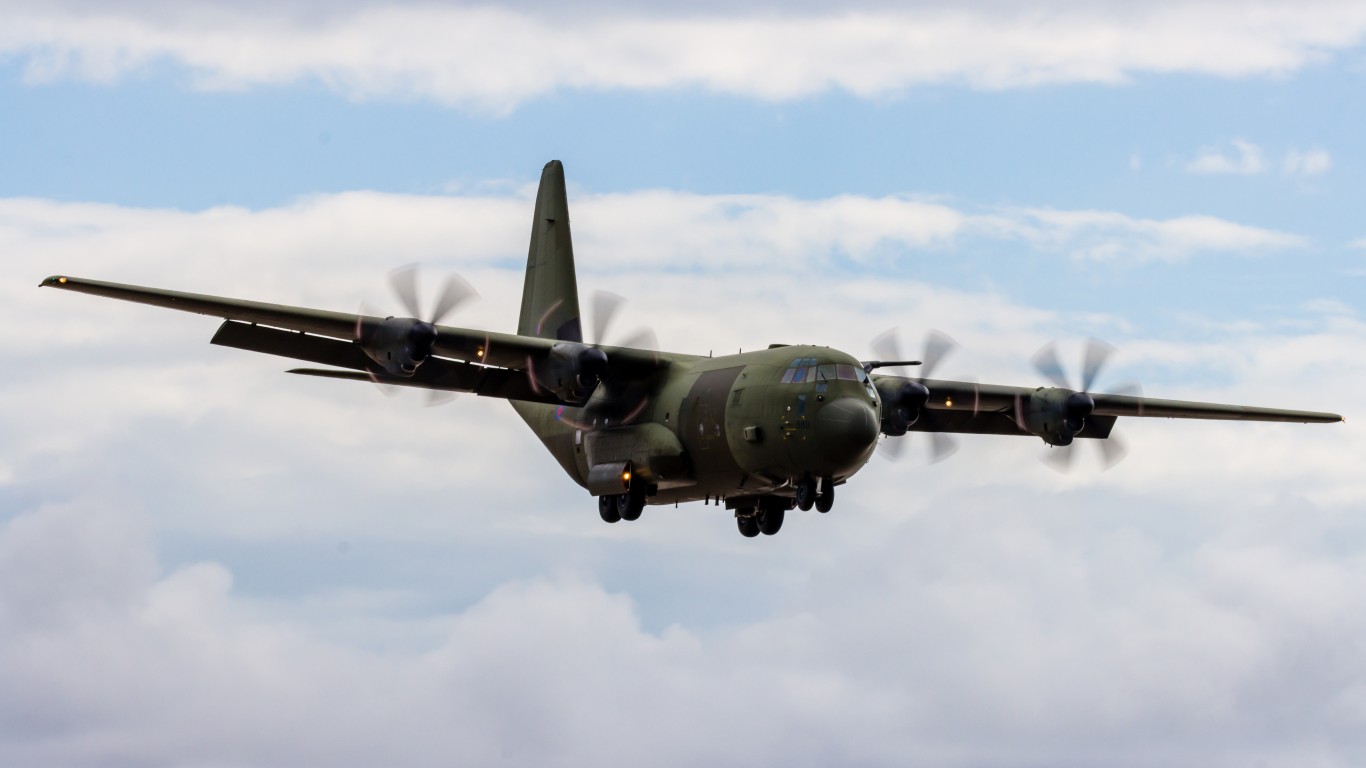
Known for its versatility, the C-130J Super Hercules comes in more variants than practically any other aircraft in service. As the name suggests, it is a workhorse of the U.S. Navy mainly in transport or logistical operations. These huge aircraft typically act as transport aircraft for cargo, personnel, and medevac. With a top speed of 416 mph, the C-130J is faster and more efficient than its predecessors.
- Type: Tactical medium transport aircraft
- Year introduced: 1999
- Active aircraft: 18
- Top speed: 416 mph
- Armament: N/A
9. KC-130 Super Hercules

Like its brother, the C-130J Super Hercules, the KC-130 Super Hercules is renown for its versatility as a distinct variant of the original C-130 series. What separates it from other variants is its capability to act as an aerial tanker and refuel other aircraft in flight. At the same time, it can carry troops and cargo. Its ability to refuel other aircraft in flight makes it an incredible force multiplier, allowing for combat aircraft to continue their missions without needing to return to base to resupply.
- Type: Aerial tanker / transport aircraft
- Year introduced: 1962
- Active aircraft: 11
- Top speed: 416 mph
- Armament: N/A
8. P-3 Orion
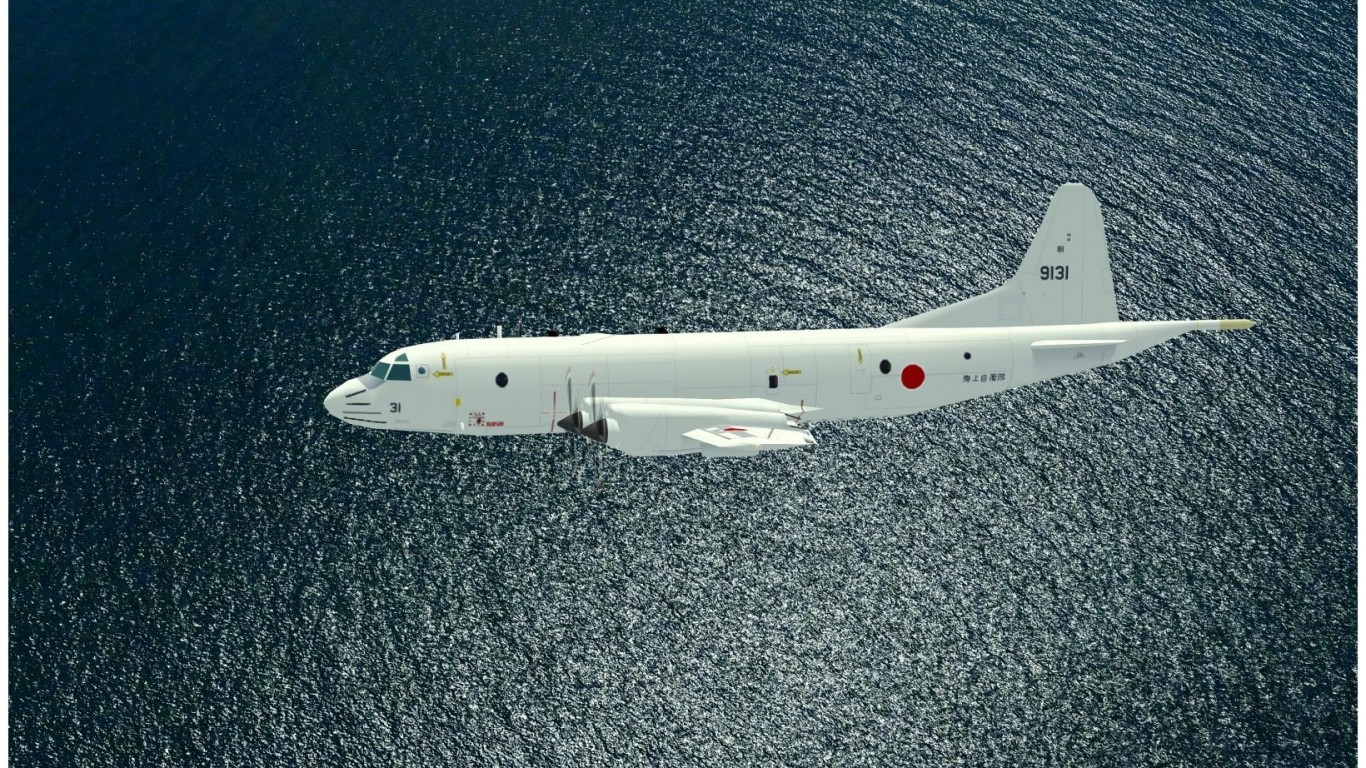
The P-3 Orion is a multi-mission reconnaissance and anti-submarine aircraft. It has been a mainstay of U.S. naval operations since its introduction in 1962. Although newer aircraft like the P-8 Poseidon might be taking its place in the fleet going forward, the P-3 Orion has had an incredible career spanning more than half a century. It can reach a top speed of 466 mph and features an impressive array of weapons. Some of these include: torpedoes, depth charges, Harpoon missiles, SLAM-ER missiles, Maverick missiles, naval mines, and unguided rockets.
- Type: Multi-mission reconnaissance, anti-submarine aircraft
- Year introduced: 1962
- Active aircraft: 17
- Top speed: 466 mph
- Armament: Torpedoes, depth charges, Harpoon missiles, SLAM-ER missiles, Maverick missiles, naval mines, unguided rockets
7. P-8A Poseidon
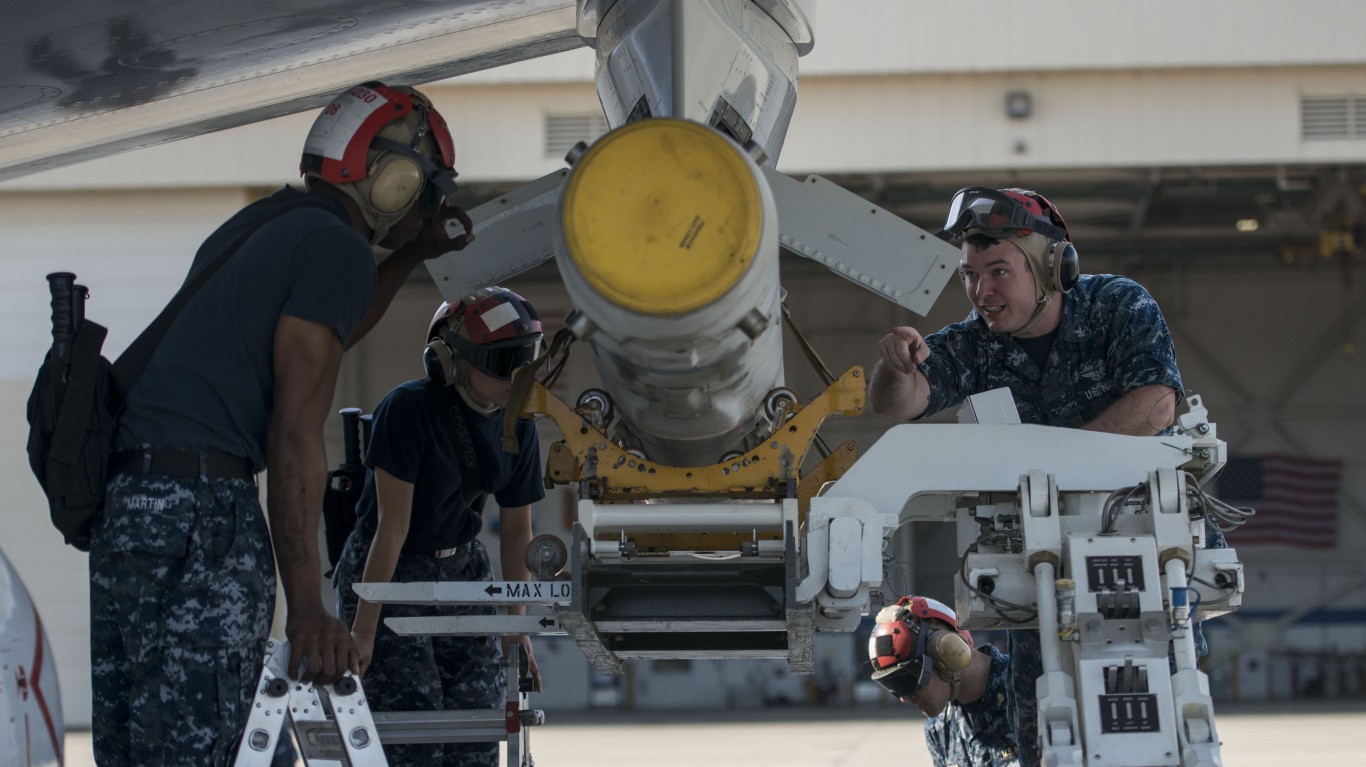
One of the newer, cutting-edge aircraft, recently introduced into the U.S. Navy is the P-8A Poseidon. It debuted in 2013 and serves as a multi-mission reconnaissance and anti-submarine aircraft. With a top speed of 490 mph, it is faster and more advanced than its predecessor, the P-3 Orion. The U.S. Navy currently operates 118 active P-8 aircraft, making it a key asset in maritime patrol and surveillance missions. Like its predecessor, it can equip a wide range of weapons including torpedoes, naval mines, air-to-surface missiles, anti-ship missiles, and stand-off cruise missiles.
- Type: Multi-mission reconnaissance, anti-submarine aircraft
- Year introduced: 2013
- Active aircraft: 118
- Top speed: 490 mph
- Armament: Torpedoes, naval mines, air-to-surface missiles, anti-ship missiles, stand-off cruise missiles
6. C-40 Clipper
The C-40 Clipper, introduced in 2001, is a versatile transport aircraft used by the U.S. Navy and Air Force for rapid and efficient personnel and cargo transport. It is one of the fastest transport aircraft in the fleet with a top speed of 544 mph. A unique aspect of the C-40 is its adaptability, namely that it can be configured to carry passengers or cargo, or a variation of both depending on operational need.
- Type: Transport aircraft
- Year introduced: 2001
- Active aircraft: 17
- Top speed: 544 mph
- Armament: N/A
5. C-20 Gulfstream IV

Capable of reaching a top speed of 582 mph, the C-20 Gulfstream IV is one of the fastest aircraft in its class. While it is a transport aircraft, it typically is used for military VIPs, high-ranking officials, or dignitaries. Considering its specialized operational capacity, there are only two active aircraft in the U.S. Navy.
- Type: Military VIP passenger transport aircraft
- Year introduced: 1983
- Active aircraft: 2
- Top speed: 582 mph
- Armament: N/A
4. E-6B Mercury
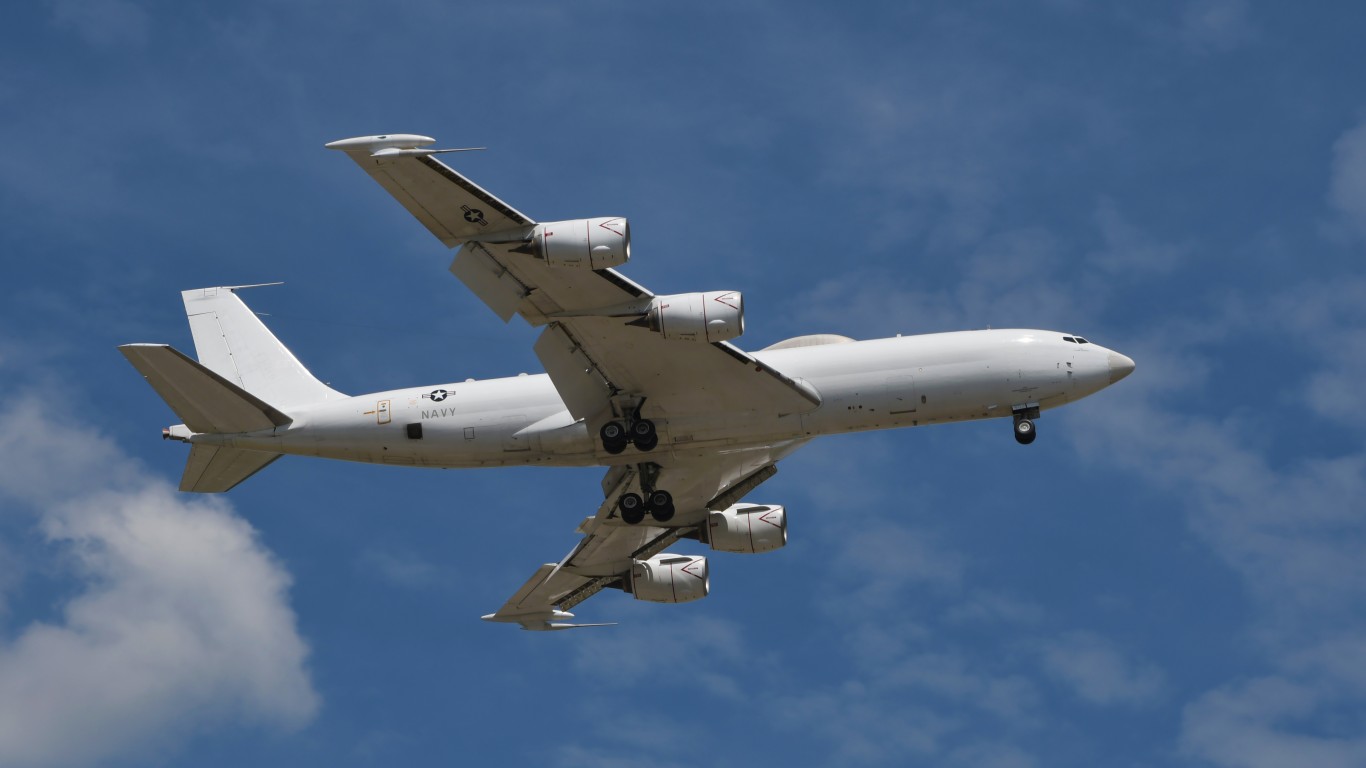
The E-6B Mercury is an airborne command post, which plays an important role in the U.S. Navy’s nuclear command and control network. With a top speed of 603 mph, it is one of the fastest command aircraft, ensuring rapid response and communication capabilities in the most critical of situations. While there is no armament to speak of on this aircraft, its significance lies in its ability to relay orders from the National Command Authority to U.S. strategic forces, including nuclear submarines, bombers, and missile silos.
- Type: Airborne command post
- Year introduced: 1989
- Active aircraft: 16
- Top speed: 603 mph
- Armament: N/A
3. EA-18G Growler
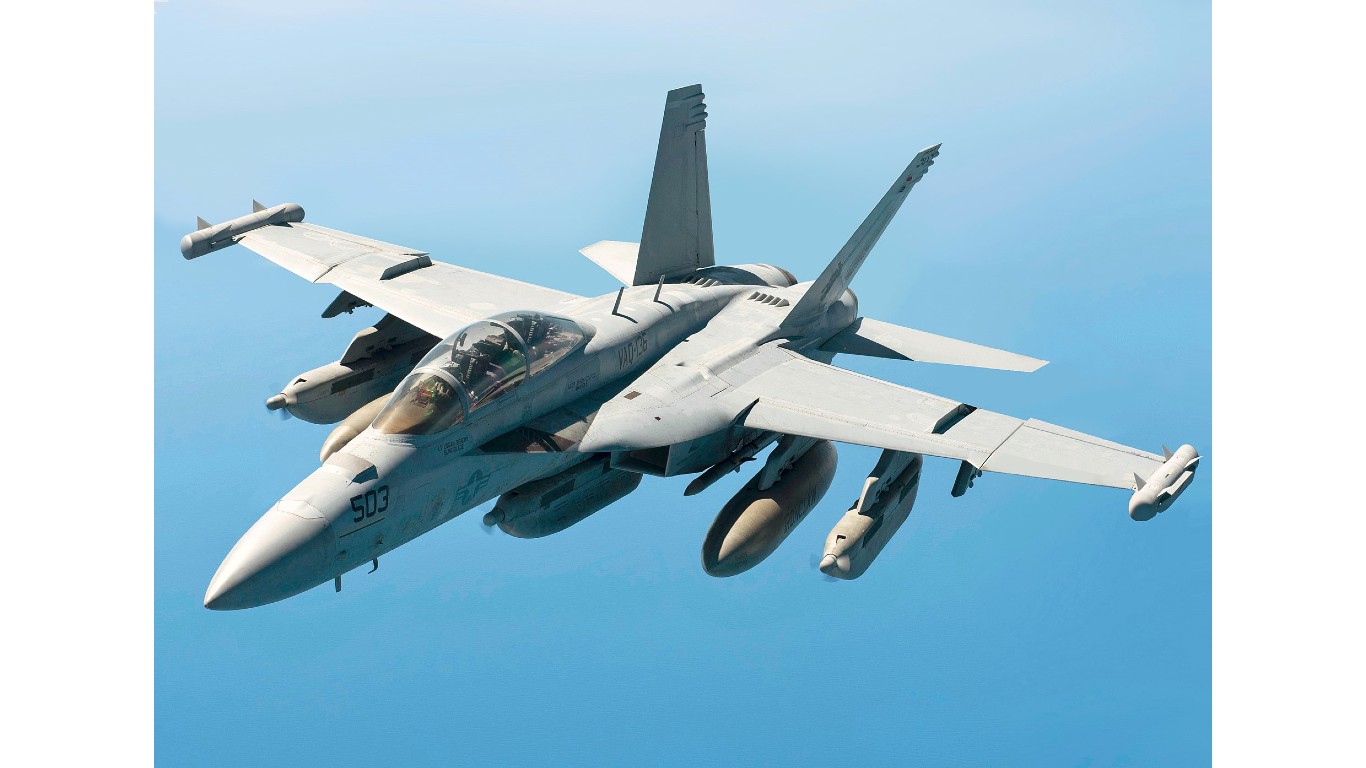
One of the newest aircraft in the Navy is the EA-18G Growler, introduced in 2009. This is a highly specialized carrier-based electronic warfare aircraft. Not only can it hit top speeds of roughly 1,200 mph but it is also equipped with detection pods, high and low band jamming pods, and advanced targeting systems like the AN/ASQ-228 ATFLIR and SHARP. Outside of the electronic warfare aspect, these jets can equip HARM missiles, AMRAAM missiles, and joint stand-off weapons. The importance of these aircraft cannot be overstated as the U.S. Navy has over 150 of these fighter jets ready to go.
- Type: Carrier-based electronic warfare aircraft
- Year introduced: 2009
- Active aircraft: 153
- Top speed: 1,181 mph
- Armament: Detection pods, high band jamming pods, low band jamming pods, AN/ASQ-228 ATFLIR, SHARP, Harm missiles, AMRAAM missiles, Joint stand-off weapons
2. F/A-18 Super Hornet
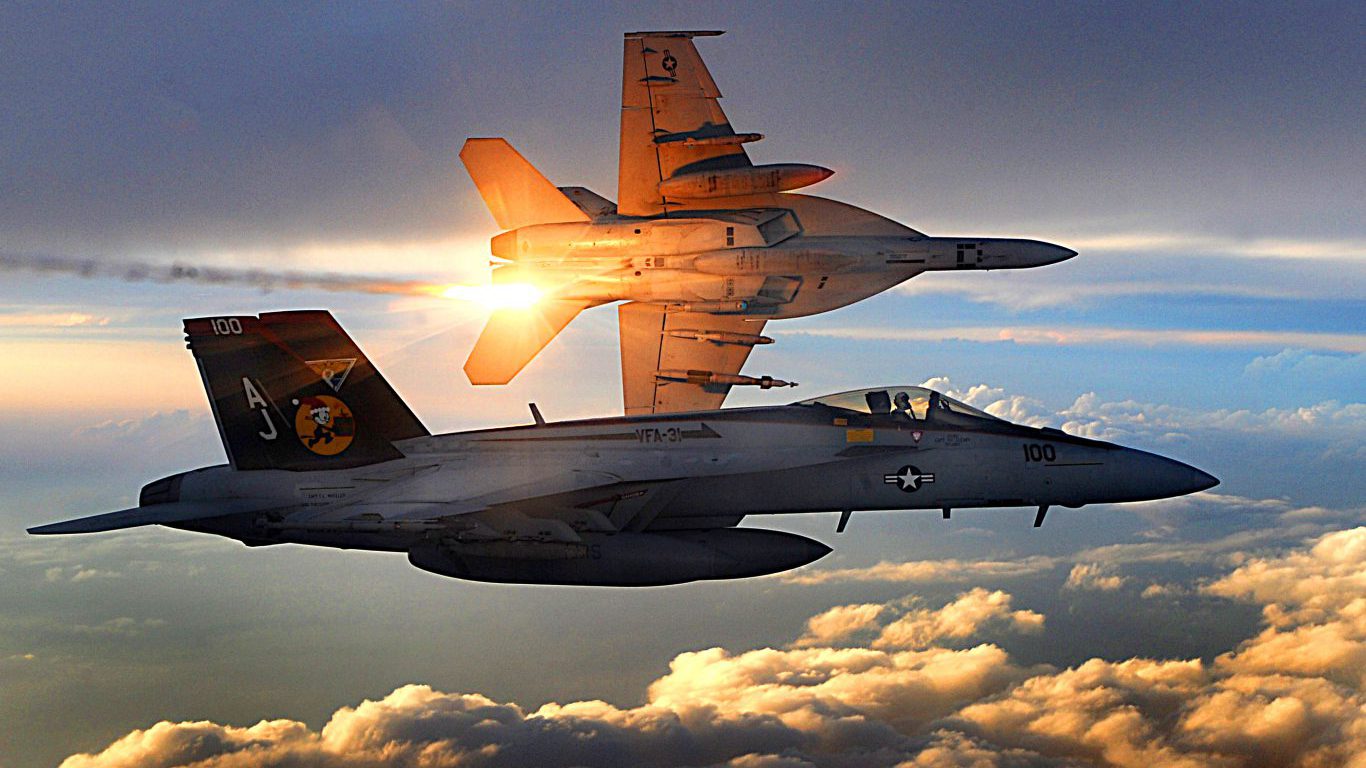
The F/A-18 Super Hornet is the bread and butter of U.S. naval aircraft, with over 420 of these jets in active service. The Super Hornet was introduced in 1999 and is capable of reaching top speeds of roughly 1,200 mph. It is one of the most versatile Navy aircraft in terms of its armament, and one of the most heavily armed. It comes standard with a 20mm M61A1 Vulcan automatic cannon, along with a wide array of missiles and bombs, including Sidewinders, AMRAAMs, Harpoons, HARM missiles, Mavericks, and joint direct attack munitions.
- Type: Carrier-based strike fighter aircraft
- Year introduced: 1999
- Active aircraft: 421
- Top speed: 1,187 mph
- Armament: 20mm M61A1 Vulcan automatic cannon, Sidewinder missiles, AMRAAM missiles, Harpoon missiles, HARM missiles, Maverick missiles, joint direct attack munitions, Rockeye II bombs, general purpose bombs
1. F-35C Lightning II
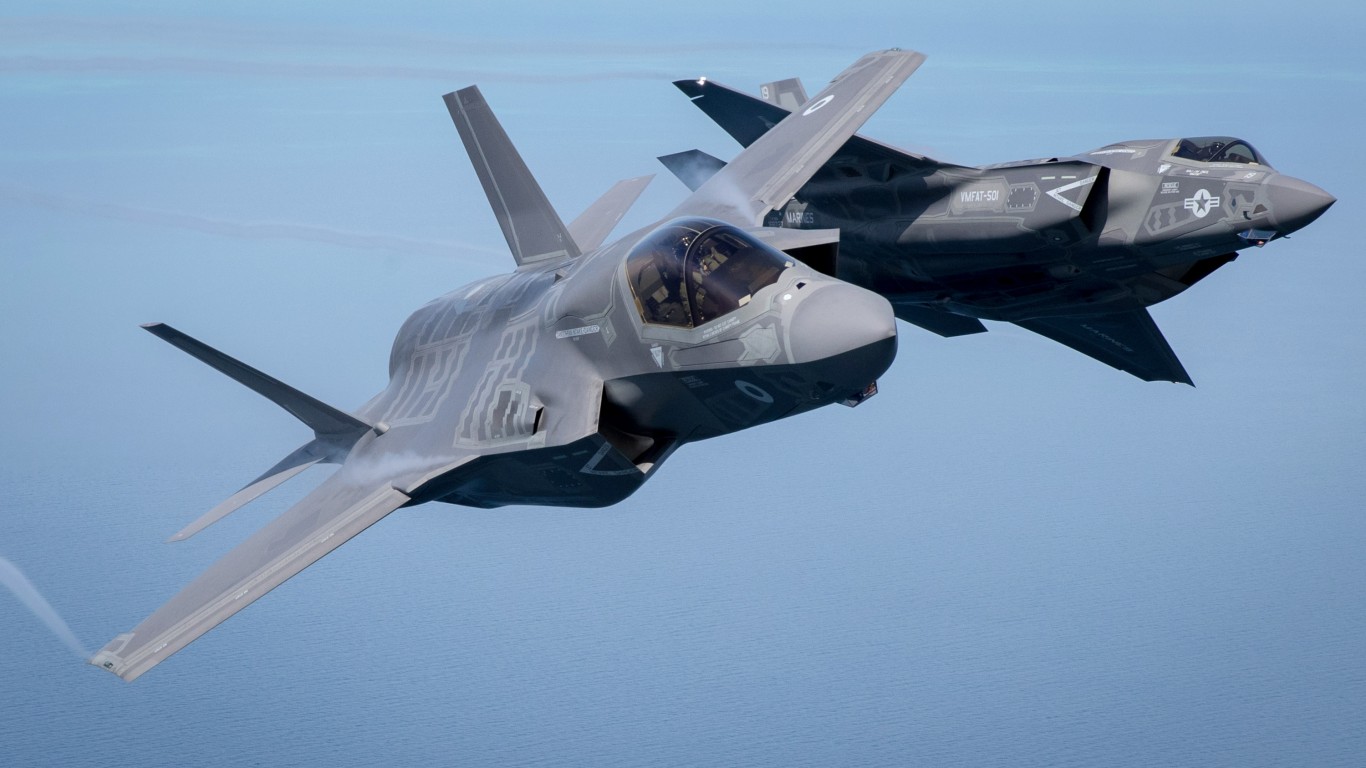
Introduced in 2016, the F-35C Lightning II represents the cutting edge of U.S. Navy aviation as a multirole fifth-generation strike fighter aircraft. With a top speed of 1,199 mph, the F-35C is the first stealth fighter designed for carrier operations. It should be noted that the F-35C variant is the one capable of takeoff and landing on aircraft carriers, as opposed to the standard variant. Currently, there are only 30 in active service of the U.S. Navy but more are on the way. These come standard with 25mm GAU-12/U cannon in an external pod, along with a diverse arsenal including Sidewinder missiles, Paveway guided bombs, Rockeye II bombs, Brimstone missiles, and Storm Shadow missiles.
- Type: Multirole fifth generation strike fighter aircraft
- Year introduced: 2016
- Active aircraft: 30
- Top speed: 1,199 mph
- Armament: 25mm GAU-12/U cannon in external pod, Sidewinder missiles, Paveway guided bombs, Rockeye II bombs, Brimstone missiles, Storm Shadow missiles, drop bombs
It’s Your Money, Your Future—Own It (sponsor)
Retirement can be daunting, but it doesn’t need to be.
Imagine having an expert in your corner to help you with your financial goals. Someone to help you determine if you’re ahead, behind, or right on track. With SmartAsset, that’s not just a dream—it’s reality. This free tool connects you with pre-screened financial advisors who work in your best interests. It’s quick, it’s easy, so take the leap today and start planning smarter!
Don’t waste another minute; get started right here and help your retirement dreams become a retirement reality.
Thank you for reading! Have some feedback for us?
Contact the 24/7 Wall St. editorial team.
